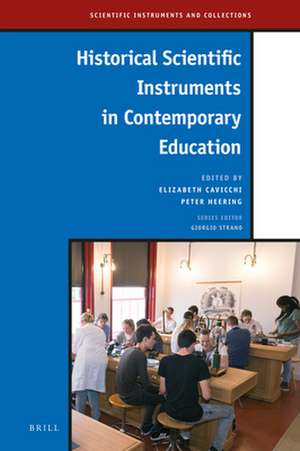Historical Scientific Instruments in Contemporary Education: Scientific Instruments and Collections, cartea 9
Contribuţii de Dominique Bernard, Paolo Brenni, Roland Carchon, Stéphane Fischer, Jan Waling Huisman, Françoise Khantine-Langlois, Alistair Kwan, Janet Laidla, Pierre Lauginie, Panagiotis G Lazos, Pietro Milici, Flora Paparou, Frédérique Plantevin, Julie Priser, Alfonso San-Miguel, Danny Segers, Constantine Skordoulis, Trienke van der Spek, Constantina Stefanidou Elizabeth Cavicchi, Peter Heeringen Limba Engleză Hardback – 17 noi 2021
Contributors are Dominique Bernard, Paolo Brenni, Roland Carchon, Elizabeth Cavicchi, Stéphane Fischer, Peter Heering, J.W. Huisman, Françoise Khantine-Langlois, Alistair M. Kwan, Janet Laidla, Pierre Lauginie, Panagiotis Lazos, Pietro Milici, Flora Paparou, Frédérique Plantevin, Julie Priser, Alfonso San-Miguel, Danny Segers, Constantine (Kostas) Skordoulis, Trienke M. van der Spek, Constantina Stefanidou, and Giorgio Strano.
Preț: 934.24 lei
Preț vechi: 1139.31 lei
-18% Nou
Puncte Express: 1401
Preț estimativ în valută:
178.76€ • 186.66$ • 147.62£
178.76€ • 186.66$ • 147.62£
Carte disponibilă
Livrare economică 25 martie-08 aprilie
Preluare comenzi: 021 569.72.76
Specificații
ISBN-13: 9789004499669
ISBN-10: 9004499660
Dimensiuni: 155 x 235 mm
Greutate: 0.59 kg
Editura: Brill
Colecția Brill
Seria Scientific Instruments and Collections
ISBN-10: 9004499660
Dimensiuni: 155 x 235 mm
Greutate: 0.59 kg
Editura: Brill
Colecția Brill
Seria Scientific Instruments and Collections
Cuprins
List of Figures
Contributors
Foreword
Introduction: Using Historical Scientific Instruments in Contemporary Education – Experiences and Perspectives
Elizabeth Cavicchi and Peter Heering
1. Reading Instruments for Historical Scientific Practice: An Experiential Pedagogy for Material Culture
Alistair Kwan
2. Filming Nineteenth Century Physics Demonstrations with Historical Instruments
Paolo Brenni
3. Making It about the Objects: A Reboot of a History of Science Course
Janet Laidla
4. Using Original Instruments from a Museum Collection in Demonstrations
Jan Waling Huisman
5. The Collections of Scientific Instruments of the Faculty of Sciences of Rennes: A Tool for School Education and for the Training of Students and Teachers
Julie Priser and Dominique Bernard
6. The Collection of Scientific Instruments from the Maraslean Teaching Center and Experimental Science Education: Then and Now
Panagiotis Lazos, Constantina Stefanidou and Constantine Skordoulis
7. Examples of the Use in Education of Historical Physics Instruments at Secondary School and University Level in France supported by ASEISTE
Françoise Khantine-Langlois, Alfonso San-Miguel and Pierre Lauginie
8. The Use of the Museum Collection for Educational Purposes
Roland Carchon and Danny Segers
9. Historical Scientific Instruments in Exploratory Teaching and Learning
Elizabeth Cavicchi
10. “What Is Happening in the Lab?” Transforming the School Laboratory into a Contextual Science Teaching Environment
Flora Paparou
11. Historical Instruments, Education, and Do-It-Yourself in the Cabinet of Curiosity of Brest, France: University Experiences in Mathematics
Frédérique Plantevin and Pietro Milici
12. Educational Experiences in Re-Enacting Historical Experimental Procedures
Peter Heering
>
13. The Lorentz Lab: Reviving the Scientific History of Teylers Museum with Working Replicas
Trienke M. van der Spek
14. The Fall of Bodies According to Galileo: A Free Adaptation from the Geneva Museum of the History of Science
Stéphane Fischer
Index
Contributors
Foreword
Introduction: Using Historical Scientific Instruments in Contemporary Education – Experiences and Perspectives
Elizabeth Cavicchi and Peter Heering
1. Reading Instruments for Historical Scientific Practice: An Experiential Pedagogy for Material Culture
Alistair Kwan
2. Filming Nineteenth Century Physics Demonstrations with Historical Instruments
Paolo Brenni
3. Making It about the Objects: A Reboot of a History of Science Course
Janet Laidla
4. Using Original Instruments from a Museum Collection in Demonstrations
Jan Waling Huisman
5. The Collections of Scientific Instruments of the Faculty of Sciences of Rennes: A Tool for School Education and for the Training of Students and Teachers
Julie Priser and Dominique Bernard
6. The Collection of Scientific Instruments from the Maraslean Teaching Center and Experimental Science Education: Then and Now
Panagiotis Lazos, Constantina Stefanidou and Constantine Skordoulis
7. Examples of the Use in Education of Historical Physics Instruments at Secondary School and University Level in France supported by ASEISTE
Françoise Khantine-Langlois, Alfonso San-Miguel and Pierre Lauginie
8. The Use of the Museum Collection for Educational Purposes
Roland Carchon and Danny Segers
9. Historical Scientific Instruments in Exploratory Teaching and Learning
Elizabeth Cavicchi
10. “What Is Happening in the Lab?” Transforming the School Laboratory into a Contextual Science Teaching Environment
Flora Paparou
11. Historical Instruments, Education, and Do-It-Yourself in the Cabinet of Curiosity of Brest, France: University Experiences in Mathematics
Frédérique Plantevin and Pietro Milici
12. Educational Experiences in Re-Enacting Historical Experimental Procedures
Peter Heering
>
13. The Lorentz Lab: Reviving the Scientific History of Teylers Museum with Working Replicas
Trienke M. van der Spek
14. The Fall of Bodies According to Galileo: A Free Adaptation from the Geneva Museum of the History of Science
Stéphane Fischer
Index
Notă biografică
Elizabeth Cavicchi completed a doctor of education (EdD) degree at Harvard University; master's degrees at Harvard, Boston University and MIT; undergraduate degrees at MIT. She has written and presented internationally on explorations interweaving history, science phenomena, teaching and learning. At MIT’s Edgerton Center, Cavicchi encourages learners to be explorers. Her seminars provide direct experiences with observation, experiment, instruments, history and social justice.
Peter Heering is professor of physics and its didactics at the Europa-Universität Flensburg, Germany. His research focuses on the history of physics, especially experimental practice, which he investigates using the replication method, the use of historical content in science education, and the historical development of teaching experiments in physics education.
Peter Heering is professor of physics and its didactics at the Europa-Universität Flensburg, Germany. His research focuses on the history of physics, especially experimental practice, which he investigates using the replication method, the use of historical content in science education, and the historical development of teaching experiments in physics education.








